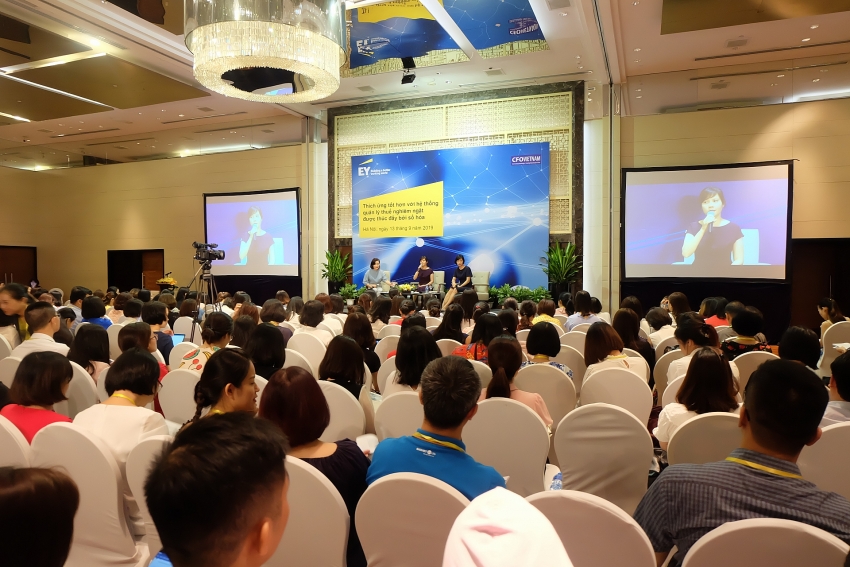EY Vietnam: Enterprises should actively manage tax risk
 |
| Hundreds of participants at the the 2019 Tax Symposium by EY Vietnam and CFO Club |
Vietnam’s tax agency has just made remarkable changes in policies, especially in tax administration reforms. The recent tax regulatory amendments aim at reducing tax compliance costs and increasing the information technology application for businesses to better comply with tax regulations.
The revised Tax Administration Law, passed by the National Assembly on June 13, 2019, will take effect from July 1, 2020. The Law introduces some new regimes on the implementation and management of taxes on the internet platform (e-tax). Accordingly, for the first time, the law sets regulations on e-invoices will be effective from July 1, 2022. It requires goods sellers and service providers to issue e-invoices to buyers. Sellers’ computers for invoice calculation and e-invoices issuing, if used, must be registered and connected with the tax authorities’ data system.
The Law, for the first time, introduces tax administration rules for e-commerce activities. Foreign suppliers running e-commerce businesses, but having no permanent establishment in Vietnam, are obliged to register, declare and pay taxes in the country. In addition, commercial banks are responsible for withholding and making tax payments on behalf of overseas businesses and individuals conducting e-commerce activities and deriving income from Vietnam.
Beside the tax policy changes and administration reforms, tax inspection and examination activities are expected more effective, gradually. The focuses of the State Inspectorate in the coming time are inspecting businesses whose tax contribution is potentially significant, and enhancing after-tax-returns examinations, especially at businesses that have inter-company transactions and signal of transfer pricing issues.
“The inspection activities will be more effective given the aid of advanced technology,” said Huong Vu, general director, EY Consulting Vietnam. “As the tax authorities’ management have become more effective, businesses must be better compliant to avoid tax penalties and back taxes."
According to Huong, being affected by trade wars, political instability, the world economy’s volatility and rapid technology advancement, countries are using tariffs as major weapons to reestablish trade fairness. However, they also create direct pressure on businesses and require them to restructure their global value chain and supply chain.
Changes in the global business environment, together with newly issued regulations and guidance on corporate tax obligations, have been substantially affecting many business activities in Vietnam. Companies should properly invest the right resources in order to meet and comply with new regulations, as well as to avoid tax risks,” she said.
At the Tax Symposium 2019, concerns about new regulatory compliance, especially e-invoicing, transfer pricing and personal income tax were answered by experts from EY Vietnam with practical experience in dealing with corporate tax, tax risk management, plus the preparation for tax inspections.
What the stars mean:
★ Poor ★ ★ Promising ★★★ Good ★★★★ Very good ★★★★★ Exceptional
 Tag:
Tag:
Related Contents
Latest News
More News
- Cashless payments hit 28 times GDP in 2025 (February 04, 2026 | 18:09)
- SSIAM and DBJ launch Japan Vietnam Capital Fund (February 04, 2026 | 15:57)
- Banks target stronger profits, credit growth in 2026 (February 04, 2026 | 15:43)
- Vietnam on path to investment-grade rating (February 03, 2026 | 13:07)
- Consumer finance sector posts sharp profit growth (February 03, 2026 | 13:05)
- Insurance market building the next chapter of protection (February 02, 2026 | 11:16)
- NAB Innovation Centre underscores Vietnam’s appeal for tech investment (January 30, 2026 | 11:16)
- Vietnam strengthens public debt management with World Bank and IMF (January 30, 2026 | 11:00)
- Corporate bond market poised for stronger growth cycle (January 28, 2026 | 17:13)
- Vietnam's IPO market on recovery trajectory (January 28, 2026 | 17:04)



























 Mobile Version
Mobile Version